- Home
- William H. Keith
Android: Free Fall Page 2
Android: Free Fall Read online
Page 2
City Flight Control gave me a fairly smooth flight. Traffic was thick at low altitudes, as usual, and it was a couple hours before my car woke me up and I saw the five-hundred story blue-green tower of the NAPD shouldering out of the mist and neon glow ahead. A trio of police security drones gave me a once-over on approach and escorted me to the roof pad. I let the car park itself while I checked in through rooftop security and escalated down to the bullpen.
Fuentes had the desk watch. “Que pasa, Cap?” he asked as I thumbed the log-in screen.
“Don’t ask,” I told him. “One of those days.” My PAD gave a sharp and peremptory chirp, and I cocked an eyebrow at him. “See what I mean?”
I didn’t bother to unfold the screen. “Harrison,” I said.
“I know who it is,” a hard voice said. “I saw your ping when you entered the building. Report to my office immediately.”
“On my way.”
The Commissioner didn’t like to be kept waiting.
Her office was on the upper Admin level behind a labyrinth of secretaries and admin assistants. Chen Mai Dawn was drop-dead gorgeous and athletically lean, pretty ordinary in a town where you can buy a sexy new body as easily as a cheap suit, and the DFM in her rooftop parking space suggested she had the credaccount to do it.
I didn’t bother asking what she was doing at the office at…God. Almost six in the morning? It was possible she’d been in her office all night. No one in the Department kept sane hours, not in New Angeles, and that extended all the way to the top.
“So, Harrison,” she said as I walked into her inner sanctum. “You find Flint?”
“He’s…unavailable for the case,” I said. Yeah, even now, I was holding back, protecting him. A word from me now and he’d never work for the Department again. I didn’t like the role of executioner.
Dawn reached for an open pack of licorice-flavored cigarettes on her cluttered desk, pulled one from the package with her lips, and puffed it alight. Definitely the old-fashioned type, despite the G-mod chassis. She had zero tolerance for shiny looks with sub-optimal performance.
“He’s drunk, isn’t he?” When I didn’t answer, she went on. “Who else do you have for the assignment?”
“Me,” I replied.
Her G-mod perfect eyebrows went up. “The Department’s not paying you for street work, Harrison.”
“And I’m not a house mouse, Commissioner.” The term was slang for a badge who never left Headquarters.
“You covering for your old military buddy? Comrades-in-arms, call of duty, all that?”
“Nuh-uh. I need to get out from behind the desk, is all. And we’re stretched damned thin. Every damned one of my assets is either on a case or OU.” Otherwise unavailable.
“We’re always stretched thin on assets, Harrison.” She considered me for a sour moment from within her smoke cloud, then flicked a bit of ash from her ‘ret into the desk disposal. “I’m going to approve this, because you’re my best forspec. And I need the best on this one.”
“Why? Something forensics-intensive on this one?”
For answer, she touched her keypad and the empty wall behind her turned into a floor-to-ceiling vidscreen, high-def, like looking into another room right next door, except that Dawn’s office was eat-off-the-carpet clean; the vid image looked like the inside of a slaughterhouse. There was even blood on the walls and ceiling.
Low-G can do that. The body, about half of it on the blood-saturated bed and the rest scattered around the room, had been taken apart by something big and hot.
“Who is it?” I frowned, then corrected myself. “Who was it?”
“Roger Mayhurst Dow. Lawyer…and political lobbyist.”
“Um. For who?”
“Humanity Labor.”
“Frag.”
Them again. I could understand now why the Commissioner wanted a good forensics specialist up there. If Humanity Labor was involved, we were going to need to dot every T and cross every I, because they’d slap you with a lawsuit just for looking at them funny. Litigious bastards.
“Looks like it was personal,” I said. “Or someone really doesn’t like lawyers.”
She tapped out something on her keyboard, and the image on the screen swung to the right, angled down, and zoomed in on something that looked like a military BFG, but wasn’t. Military hardware, even of the Big Fraggin’ Gun variety, tends to be a tad more discriminating.
I leaned forward to read the fine print embossed on the murder weapon’s muzzle. “Alpha Prospecting,” I read aloud. It was as I’d thought. “A mining laser.”
“Huong-Zhen regolith beam laser tunneler, Mark V, Mod 2,” Dawn told me in clipped, precise tones. “Man-portable, 100-kilowatt throughput. Serial number identifies it as one reported missing from Alpha Prospecting two days ago.”
“So we’re looking for a disgruntled miner,” I said. I frowned. “Or a disgruntled mining clone…”
“Maybe. But it took some sophisticated electronics knowledge to bypass Beanstalk security on this one. How the hell did someone smuggle a mining laser up there into an orange-sec zone? Especially if he was a clone?” She tapped the side of her neck. “Tracking tag.”
“So the miner had help?”
“Had to be. Someone with some very serious hacking skills.”
“Great. That narrows it down to…what? Maybe five, six million jack-hackers in Earthside New Angeles alone? A few thousand more in Heinlein?”
She click-clacked out another combination of characters on her keyboard. “It’s making us look very carefully at one in particular…”
The bloody crime scene vanished, replaced by a larger-than-life-sized image of a kid.
I say “kid,” but his bio said he was twenty-two. He looked young, though, with the sullen expression and the casual BDSM leatherwear of the self-made anti-authoritarian rebel. Height one-eighty, green hair, a face full of piercings. He wore eyeglasses, but I knew his vision was G-mod perfect, and the glasses were projection screens for some fairly sophisticated personal electronics.
Yeah, I knew Ji Reilly—“Noise,” as he preferred to be called. Boy genius, probably the hack behind the Stuckey IT incident a couple of years back, but no one could ever prove it. I’d been on that case—a slick identity theft that had made half a million dollars vanish from a fat business account with no IP trace and no electron trails. The funny thing was that Reilly had owed a bundle to the 14K…and suddenly he was real cozy with them, pulling down an estimated five-K a month as a software consultant. A lot of us saw the connection, but we couldn’t find enough to make charges stick.
“We have an APB out to bring him in for questioning,” Dawn told me. “He recently took on a year-long contract with Melange Mining and we don’t know why. Usually, he’s a freelancer, doesn’t like the big corps.”
“Oh, he doesn’t mind the corps,” I said. “He just sees them as targets.”
“Well, he’s working for Melange now,” the Commissioner said. “And they have no reason to love anyone who wants to abolish the use of androids.”
“They sure as hell won’t want to see anti-clone legislation go down in D.C.”
“Exactly.” She switched off Reilly’s image and turned to face me. “Listen hard, Harrison. The Clone Riots last year left everybody on edge, and there were those rumors last month about android conspiracies. The damned city’s about ready to explode. The Feds are watching, and they’re just itching to invoke the Accord. If Mayor Wells is forced to declare martial law, the Feds are going to be on our tails like sand at the beach. You follow me?”
“Yeah. A little too well.”
“I want this kept quiet. If the nosies get wind of this, there could be panic and maybe more dead clones, and we definitely don’t need that right now. If a news-nosey hits you, it’s strictly ‘no comment.’ Got it?”
“Yes, ma’am.” She didn’t say so, but I knew she was thinking about Lily Lockwell in particular. Damn news-nosie.
“Mayor Wells is alre
ady riding me about this one. When the Mayor’s not happy, I’m not happy. And when I’m not happy—”
“I’ve got the picture, Commissioner. Silent running it is.” I was accessing the Commissioner’s evidence files, downloading the vid she’d just shown me.
“Find me a triggerman,” she said, “and get me hard evidence, something that’ll stand up in court. We don’t want Humanity Labor suing the city because we botched the investigation.”
“I’m on it.” I looked at my wrist, pressing the skin at the base of my palm to make the time visible. “I’ll vid you from the crime scene.”
“I want a conviction, Harrison. And I do not want more dead clones in the streets.”
“Got it.”
And I headed downstairs to pick up a club.
Chapter Two
Day 1
I wouldn’t have to pack anything. All I needed was to check out a club from the gear locker. Officially, it’s a standard NAPD-issue thumb-locked evidence kit, but we call it the “club,” for CLB—Crime Lab in a Box. I was going to need it at that bloody crime scene.
My black Wuhan took me northeast, climbing for altitude past the domed sprawl of the Blue Sun Stadium and angling north toward the skyward stab of the Bradbury Tower arcologies. The rain had cleared in the past hour, replaced by a weak morning sun filtering through a toxic haze. I could just make out the slate gray expanse of the ocean in the distance far off to the right. The Andes, to the east, were still shrouded in bank upon towering bank of clouds.
New Angeles is, with no question whatsoever, the biggest and most populous megapolis on Earth, with hundreds of millions of citizens packed in ten or twelve thousand to the square kilometer, and God alone knows how many disenfrancistos, streetbangers, sewer rats, under-city scavengers, clones, and bioroids. Downtown takes up a quarter of what used to be the sovereign nation of Ecuador, and if not for hoppers and tube-levs, getting around town would take days.
And sometimes even air travel is slow. New Angeles Air Traffic Control was routing me around to the west with an estimated flight time of one hour. At first I tried to catch up on a bit more sleep, but I was already into full-blown Case Mode, going over the information the Commissioner had given me in my head and on my PAD.
I’d fanned open the display on my Palm Access Device and pulled down the history. Human First was arguably the largest of several hundred underground organizations devoted to doing away with clones and bioroids, and that was just here in the New Angeles area. Their front company—Humanity Labor—the workers centers, the workers’ comp, health insurance companies, even a few religious institutions, all felt that life would be a lot better if the vats and the bioroid assembly lines were all shut down.
And that was a real problem, for New Angeles in particular. Our legal jurisdiction extended all the way up-Stalk to Heinlein, and that meant the helium-3 mining consortia. Bioroids—android and gynoid robots—weren’t so much of a problem up there, but clones were. The miner’s union didn’t like them because they replaced real humans in the workforce; the management of big mining corps, like Melange, loved them because it was cheaper to buy a few thousand Jinteki clones and work them to death—sorry, fully utilize proprietary assets—than it was to hire humans and pay for their workers’ comp.
Me, I can’t say I like the way clones are treated—they’re human, damn it, no matter what their genomic mods and conditioning—but I also know there isn’t anything I, personally, can do about it. That ancient adage about not being able to fight city hall went double for the big megacorps like Jinteki, or the congresscritters they bought and sold like commodities on the NYSE.
I didn’t much care one way or the other whether they decided to stop production or not, but then my job wasn’t being threatened by Jinteki worker clones or the latest in AI-imprinted hardware out of Haas-Bioroid. The human simulants I knew personally were all decent sorts—better behaved than most people of my acquaintance. I tend to be pretty apolitical myself, but so far as I could see, it was the androids—a catch-all term for both robotic bioroids and the so-called clones—that were getting the raw end of the deal, not the other way around.
The Commissioner had been dead right about one thing: the riots last year had been very nasty. Hundreds of clones had been killed, several bioroids had been rather messily disassembled, and a lot of real people had been killed or hurt. The Mayor had just managed to avoid calling in the Feds. If New Angelinos agree on anything—which is saying one hell of a lot—it’s on the need to keep the Feds the hell out of our business. They don’t like it that we have the Beanstalk, and for thirty years they’ve been looking for any excuse to move in and appropriate it and the golden cash flow cascading down-Stalk.
And now a ristie—the word came from “aristocrat” and referred to any of the ultra-rich denizens of the tops of their klick-high arcologies—had been offed in a spectacularly messy fashion, and some of the evidence, at least, pointed to a miner…and that almost certainly meant a clone.
Not good.
I needed to get up-Stalk fast.
I’d given some thought to the possibility of dropshipping up-Stalk—it would be a little faster than a beanpod—but decided that I didn’t want another lecture from the Commissioner about Department budgets and my sacred responsibility to the taxpayers. A beanpod would get me there quickly enough.
First, though, I had to get to The Root.
I parked in the tower garage in Quevedo at the western foot of the mountains, and took the elevator down to the tube-lev Metro. With my evidence kit in hand, I electronically flashed my badge to avoid baring all for the backscatter screening, and was ushered through to the main concourse, where a couple thousand people wandered through a hall the size of the Blue Sun Stadium, hunting for baggage, dragging along screaming children, occasionally reuniting in enthusiastic hugs, and raising a dull roar of background noise that constantly echoed throughout that vast chamber, despite the sonic suppressors.
I downloaded my ticket into my PAD and followed a holographic yellow light glowing in the air overhead to find my platform. The car was already unpleasantly crowded when I stepped aboard—I’m mildly claustrophobic in crowds, but I can usually ignore it. I felt the little bounce under my foot as the mag-levs adjusted to my weight. The ticket told me I was in seat 20A, and it only took a few moments to convince the drugged-out tourist that he was in my seat, and would he like to move himself or be moved, now?
A few seconds later, a holographic attendant reminded us all to stay in our seats and buckle our seatbelts, as serious injury could result under acceleration if we did not do so, and that the New Angeles Transit Authority could accept no responsibility for personal injuries if we did not follow the rules.
And then another guy as big as me was sitting in my lap…or at least that was the way it felt as we entered the vacuum and accelerated at two gravities.
The two-G acceleration lasted just eight and a half seconds, and then the mag-lev train was hurtling through hard vacuum a kilometer or more beneath the surface at 170 meters per second. There were no windows, of course—there’s nothing to see outside in a tube-lev tunnel, after all—and the kilometers passed in utter silence…well, silent except for the squalling baby in 19B, and the loudly arguing couple somewhere in the back. I pulled the morning edition of the New Angeles Sol from my seat dispenser. It was a sheet of silk-fine, carbon-weave cloth when I tugged it free, but it turned rigid in a second or two, the dark surface coming alive with images and print. I thumb-flipped through the first dozen pages or so, looking for news about the Dow murder.
Nothing, thank God. Cardinal Reese, I noticed, had given a thoroughly inflammatory homily last night as a guest speaker at the Church of St. Theresa on the evils of “soulless android simulants” in today’s society…and Human First was calling for the elimination of miner clones to reduce the high unemployment rate among real people. Same-ol’, same-ol’. The page one vid of Reese showed him gesticulating repeatedly and angrily, his face flo
rid and impassioned. I considered popping in an earpiece to hear the text of his sermon, but thought better of it. I don’t know Who’s running the universe…but I seriously doubt that Cardinal Reese or the Temple of Sol or any of the rest of them do either.
I did a search to see if the rag had anything about Roger Dow, but all I came up with was an article on page 121 about how he was due to meet with a delegation of congresscritters at the Carousel Boardrooms tonight, where he would have proposed legislation allowing for the gradual elimination of simulants, starting with the lunar mines.
Judging from what I’d seen on Commissioner Dawn’s vid wall, he wasn’t going to make that meeting.
I entered a note to myself on my PAD: make sure that those messy remains I’d seen in Dawn’s office were those of Roger Dow. The first rule of crime scene analysis was not to take anything for granted. A DNA check would prove the victim’s identity easily enough, but I’d run that test myself rather than rely on the Space Elevator Authority.
Never assume.
The Dow article, I noticed, carried Lily Lockwell’s byline. If she was interested in Dow, she’d be following up on that planned meeting tonight. I just hoped I could reach the crime scene before she did, and maybe head her off.
After porting the article to my PAD, I dropped the news rag into the recycler pocket, then keyed my PAD’s secretary to pull down whatever it could find on one Roger Mayhurst Dow. on the Net.
Netpedia had a fairly extensive bio on the guy. Yale Law, class of ‘21. Married, one wife, one kid. Private law practice out of college, then a Southern California state senator for four years…followed by a stint in the U.S. Senate for six. Lost a bid for re-election, then joined the firm of Marshall, Applewhite, & Dow the following year—one of the big SC lobbying firms. Turned out the “Dow” on the firm letterhead was his father, Roger Mayhurst Dow, Sr., and the family was better than well off. Junior’s estimated personal worth was 450 million, mostly in private investments in both commercial spacelines and the Beanstalk. It seemed politics had agreed with him, and the fact that one of Marshall, Applewhite, & Dow’s biggest clients was the North American arm of 14K hadn’t hurt either.

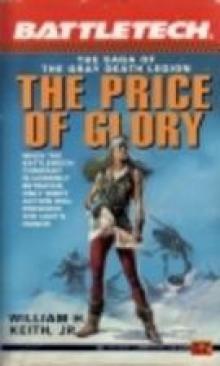 The Price of Glory
The Price of Glory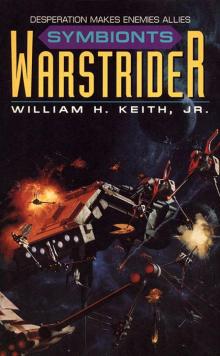 Symbionts
Symbionts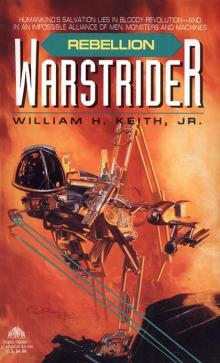 Rebellion
Rebellion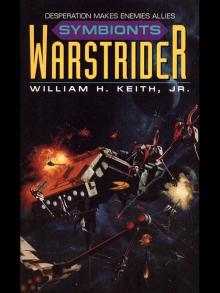 Warstrider 04 - Symbionts
Warstrider 04 - Symbionts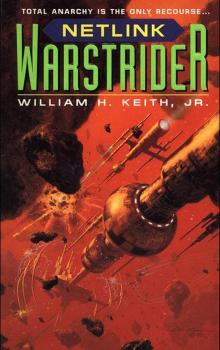 Netlink
Netlink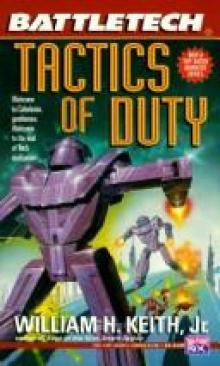 Tactics of Duty
Tactics of Duty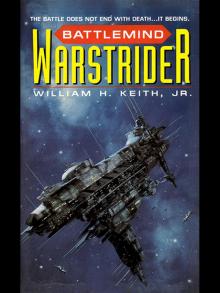 Warstrider 06 - Battlemind
Warstrider 06 - Battlemind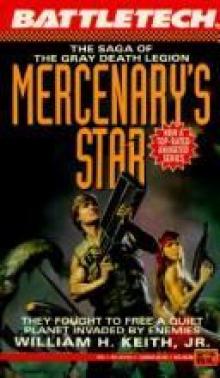 Mercenary's Star
Mercenary's Star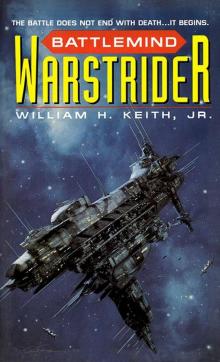 Battlemind
Battlemind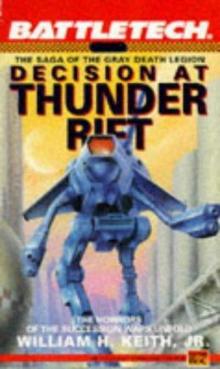 Decision at Thunder Rift
Decision at Thunder Rift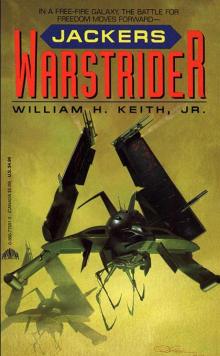 Jackers
Jackers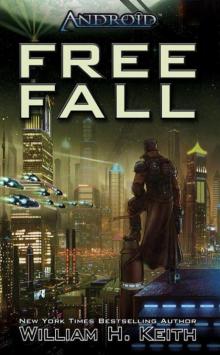 Android: Free Fall
Android: Free Fall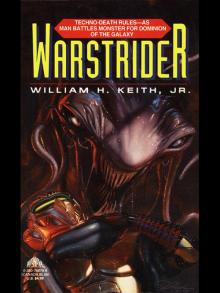 Warstrider 01 - Warstrider
Warstrider 01 - Warstrider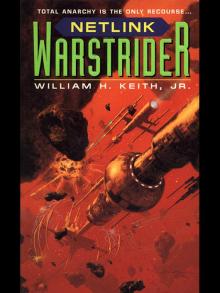 Warstrider 05 - Netlink
Warstrider 05 - Netlink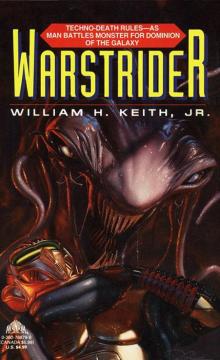 Warstrider
Warstrider